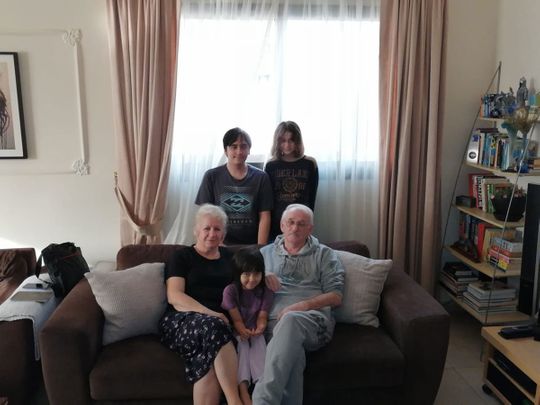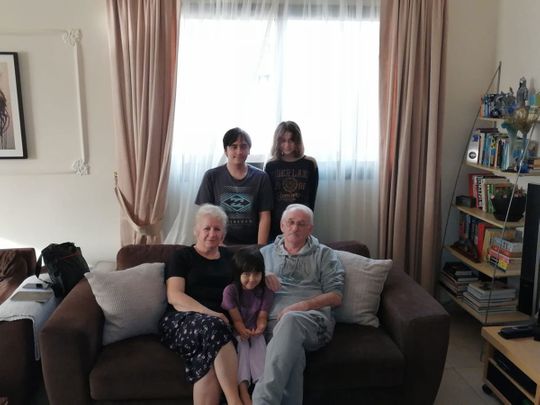69-year-old in Abu Dhabi returns to normal life a day after minimally invasive valve replacement

Image Credit: Supplied
Abu Dhabi: A 69-year-old Abu Dhabi resident has been able to return to his daily life a day after undergoing valve replacement surgery.
The procedure using the latest technology – a minimally invasive transcatheter aortic valve replacement (TAVR) –was performed at the Cleveland Clinic Abu Dhabi (CCAD), part of the Mubadala Health network.
“It was exciting to read that I was going through the same [procedure as actor Arnold Schwarzenneger]. I’m from Bosnia and he is from Austria, and I’ve seen a lot of his movies, and after this valve replacement operation at CCAD, I can say that I feel as strong as he looks in them,” said Edin Mackic, a film fan.
Mackic presented to CCAD with heart failure symptoms, including shortness of breath and chest pain. He was found to be suffering from severe aortic stenosis, caused by a calcific and degenerative valve disease. This serious valve problem restricts the blood flow from the left ventricle to the aorta, but may not cause noticeable symptoms immediately.
“I’ve always been healthy, with not many complaints except for high blood pressure and the occasional spike in my blood sugar levels. But I’ve usually put a lot of my health concerns down to age. In October, I felt like someone was stabbing me in the back with a knife. I was afraid and decided to see a doctor,” Mackic said.
Dr. Ahmad Edris, staff physician at the CCAD Heart and Vascular Institute was part of Mackic’s care team, and said his case should serve as an important lesson for people to get examined for heart issues regularly.
“A lot of older people ignore symptoms because they think shortness of breath and reduced physical activity is part of growing old. But a significant number also have valve disease, and regular screening can help identify problems like heart murmurs early on, which helps improve the outcomes for these patients,” Dr Edris said.
“At the same time, physicians caring for the elderly shouldn’t feel like they are out of options to treat them because they think open heart surgery can be risky for the frail. In fact, most of our patients undergoing TAVR are above the age of 75 years, and almost all are discharged the next day with swift recovery,” the doctor added.
In TAVR, the valve is replaced using catheter-based technology through a small opening in the leg artery. The minimally invasive surgery can be performed in appropriately selected low-risk patients.
“The decision to perform TAVR is made after careful consideration of the patient’s medical history by an experienced multidisciplinary team comprised of both cardiac surgeons and cardiovascular medicine consultants. With Mackic, we discovered clinical features, including severe disease involving the arteries leading to his brain, that placed him at high risk for stroke with traditional open-heart surgery,” Dr Edris said.
The TAVR team was able to replace Mackic’s valve with the latest fourth generation TAVR technology using conscious sedation rather than general anesthesia, which further reduced the risk of complication. It also helped recovery while preventing side effects of typical open-heart surgery. CCAD is the highest volume TAVR center in the UAE, with all patients included in a registry to evaluate and report outcomes.
“We use a minimalist approach for this procedure and have implemented the same best practices as Cleveland Clinic Foundation in the United States. This has allowed us to achieve excellent and comparable outcomes. It takes about 45 minutes to perform the procedure, and 90 percent of our patients are discharged the next day,” Dr Edris said.
The physician explained that a minimalist approach means using minimal sedation rather than general anesthesia, avoiding most of the invasive catheters used in open heart surgery. It also eliminates the use of more invasive ultrasound or echocardiogram imaging guidance, and uses imaging through the chest wall instead.
Physicians at Cleveland Clinic Abu Dhabi have also achieved a low pacemaker rate in patients that have undergone this surgery.
“We have achieved this by our implantation technique to avoid the electrical system of the heart. This means that we have only had to implant a permanent pacemaker in a single patient in the last two years,” Dr Edris said.
Mackic himself said that the surgery had given him a new life.
“No words can express how thankful I am for the care I received. I feel younger now and have been out and about since leaving the hospital. My message to people is that it is important to see your doctor, especially as you get older so that you can live a longer and healthier life. If I have any health problems now, my doctors know that, like Arnold, I’ll be back,” he said.

